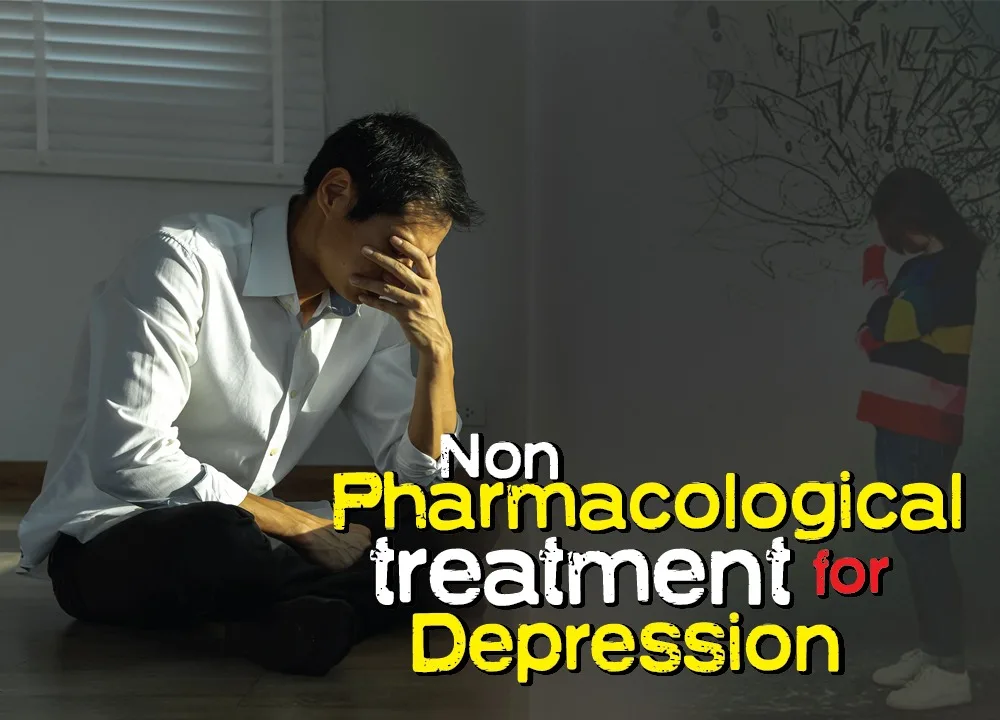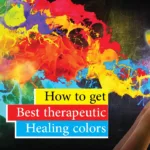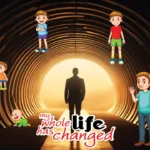Non pharmacological treatment for depression: She is restless and suffers from anxiety due to troubles in her life. She also faces an unbalanced, mean, and exhausting relationship with her partner. Unmatched relation is the root cause of life disturbances and sadness. Those with a matchup partner have been greatly blessed. Due to unbalanced relations, different problems arise from her children. A person feels alone; when no one is harmonized with their thoughts. A bit problem become a big one. Sometimes she feels like attempting suicide. For ending her life means solving all problems, she thought. She often does not sleep the whole night due to stressful environmental conditions.
This condition is not the only cause of Depression. Depression may also occur due to hormonal imbalance. Especially in females. Progesterone-induced Depression, postpartum Depression, etc. Hence, Depression has many causes.
As time passes, severity occurs. All symptoms grow.
Now the quick alert message from my brain came. It’s time to treat Depression. The second question arises about which type of treatment should be carried out. I have strong willpower to manage it through non pharmacological depression treatment.
What are non pharmacological treatments for Depression?
Non-pharmacological management of depression involves psychotherapy, counselling, mindfulness, and interpersonal therapy. As well as balanced, adequate sleep, mindfulness exercise, and many factors are included in the non-pharmacological treatment of Depression.

Nonpharmacological depression treatment is effective against the first-line phase of Depression or mild Depression. However, in moderate or severe cases should consult with a healthcare professional. Patient willingness is also important. You can accompany non-pharmacological treatment with pharmacological treatment.
Interpersonal therapy (IPT) and cognitive-behavioral therapy (CBT):
These are two psychotherapy techniques that can be used to treat Depression. They seek to alter unfavorable mental attitudes and conduct that fuel depression.
Regular exercise:
Regular exercise can raise serotonin levels, lower stress levels, and elevate mood.
Mindfulness:
Meditation, yoga, and deep breathing are examples of mindfulness-based therapy that help lessen the symptoms of Depression and enhance general well-being.
Social support:
A receptive and loving social network can ease anxiety and offer consolation. Spending time with your loved ones.
Sound Sleep:
Having a regular sleep pattern, avoiding devices before night, and setting up an atmosphere that encourages sleep; can all help lessen sadness symptoms.
Nutritional support:
Eating a healthy, balanced diet rich in vitamins and minerals can help reduce the symptoms of Depression. A healthy man may handle troubles more nicely without tiredness than an unhealthy man.
Light treatment:
Light therapy includes exposure to strong light, which can enhance mood in those suffering from seasonal Depression and control circadian rhythms.
Color therapy may also enhance mood and reduce anxiety, such as the orange color used to treat sadness.
Acupuncture:
Acupuncture is thought to help patients with Depression; feel better by balancing their energy flow.
Relaxation methods:
Progressive muscle relaxation, facilitated imagery, and aromatherapy might help lessen depressive symptoms.
Art, music therapy, or creativity:
The goals of art and music therapy are to encourage emotional expression and mood improvement via creative activity.
Seeking new knowledge:
Innovations may also help to decrease the symptoms of Depression.
Spiritual awakening:
It is another broad class of mind-soul therapy. Under these shadows of trees may open the door from Depression to enlightenment.
Non pharmacological treatment for major depressive disorder reduces depression symptoms and should be considered along with anti-depressant therapy for treating mild-to-severe Depression.
What are the non pharmacological interventions for depression:
Non pharm treatment for depression, there are various efficient psychological interventions:
Cognitive behavioral therapy (CBT) :
People learn to control their symptoms. This therapy also recognizes and changes harmful or distorted thought patterns contributing to their Depression.
Interpersonal therapy (IPT):
It is a form of counselling that focuses on enhancing a person’s connections with others. It enhances their social network to help them. To make them better communicators, problem-solvers, and stress managers.
Mindfulness-based cognitive therapy (MBCT):
Cognitive therapy with mindfulness components is called mindfulness-based cognitive therapy (MBCT). It teaches patients how to accept their thoughts and feelings without passing judgment on them.
Behavioral activation :
This strategy involves encouraging people to participate in activities that make them feel good or successful. Further, it raises their degree of activity and participation in daily life over time.
Psychodynamic therapy :
This form of therapy helps patients understand their underlying ideas and feelings by addressing the unconscious conflicts and emotions that may contribute to their sadness.
Group Therapy :
Connecting with others experiencing similar things and receiving support and advice from their peers may be very helpful for those with Depression.
E-mental health resources:
These are the following e-mental health resources that help with potential treatments for Depression:
Moodfit
It is a smartphone application intended to measure mood and mental health.
It provides activities to enhance mental health and interaction with a trained therapist.
Talkspace:
Talkspace is an online platform for therapy and counselling.
It gives users access to licensed therapists through voice, video, or chat.
MoodGYM
It employs cognitive-behavioural therapy methods to aid people with anxiety and sadness.
Betterhelp:
It gives users access to trained counsellors and other mental health specialists.
They can assist with a variety of mental health conditions, including Depression.
Headspace:
A well-known app for meditation and mindfulness.
Headspace provides instructions for guided meditations. It may help to quiet racing thoughts and lessen anxiety and despair.
These devices are not a replacement for expert medical care. For a precise diagnosis and treatment plan if you exhibit signs of Depression, Consult a medical expert.
Non pharmacological treatment of Depression in adolescents and young adults:
It is necessary to keep far from our innocent generation to spread the problem, Depression.
How are we managing non-pharmacological methods of Depression in adolescents and young adults?
There are some therapies through which we can treat Depression in young adults.
Cognitive-Behavioral Therapy (CBT):
It is a talk therapy that focuses on modifying unfavourable attitudes or depressing behavior. It enhances optimism.
CBT may help in stress reduction and problem-solving in adolescents and young adults.
Interpersonal therapy (IPT):
Relationships and social interactions are the main discussion topics in interpersonal therapy (IPT).
IPT assists teenagers and young adults in developing better communication skills, recognizing and resolving issues, and creating support networks.
Mindfulness-based interventions:
It includes Mindfulness practices, such as yoga and meditation. It helps teenagers and young adults to feel less stressed and anxious, relax more, and have better moods.
Teamwork activities or exercise:
It can help you manage your sadness by generating endorphins and boosting your self-esteem.
Encouraging kids and teenagers to engage in activities. Incorporating physical exercise into their daily routines; may enhance the feeling of love, teamwork, and support.
Nutrition:
A balanced diet high in fruits, vegetables, and whole grains will help lift your spirits and lower your chances of developing Depression.
Promoting healthy eating among teenagers and young adults is a useful strategy for controlling their mental health.
Taking a healthy lifestyle, having positive thoughts, and being grateful for keeping a healthy spirit are essential.
Frequently Ask A Question:
What is the best natural anti-depressant?
The best natural anti-depressants include:
- Lavender
- Omega- 3 fatty acids
- St.john’s wort
- SAM-e (S-adenosylmethionine)
These are effective natural anti-depressants. But. It is necessary to consult a Doctor in a severe stage of Depression. These natural substances may be accompanied by a pharmacological treatment method.
What is a non-medical treatment for Depression in older people?
It has been discovered that bright light therapy can reduce depressive symptoms and enhance mood and sleep. Bright light therapy should be administered for at least one week. In contrast, the ideal duration is still unknown. If you’re considering Bright Light Therapy for Depression, please consult your primary care physician.
What are the four treatments for Depression?
Depression can be treated with psychiatric therapy, education, dietary modifications, and social support. Additionally, some people may need to take anti-depressants. Be patient; a medication could take up to six weeks to start working.
What are the non pharmacological treatment for postpartum depression?
Postpartum depression common mental disorder; that women suffer after childbirth.
Non-pharmacological treatments for postpartum depression include therapy such as:
- cognitive-behavioural therapy
- Interpersonal therapy,
- support groups,
- exercise,
- a healthy diet, and
- adequate sleep.
What are the non pharmacological treatments for bipolar disorder?
Bipolar disorder is a chronic psychosocial impairment. it involves the different types of therapies which try to stabilize the mood of the patient. It includes cognitive-behaviour therapy, interpersonal therapy, electroconvulsive and magnetic stimulation therapy. Therapies help in stress management. regulate the sleep cycle and lifestyle changes.
Conclusion:
It is very important to keep our people away from the disorder of Depression. Depression may become life-threatening. It is not only disturb the patient’s life itself. But surrounding people may also be affected due to symptoms of Depression; that individual may suffer.
Non pharmacological treatment for Depression includes relaxing therapy, adequate sleep, regular exercise, social support, gratitude, forgiveness, acupuncture, color therapy, and many more activities that give you pleasure and create inner peace within the soul and mind.




Best best best..
[…] managing anger and depression separately, non-pharmacological methods are fundamental. They are coupled with pharmacological therapy and are also effective on their […]